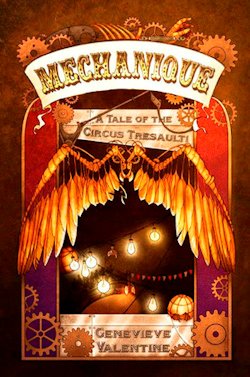Genevieve Valentine turns her intoxicating talents towards The Twelve Dancing Princesses in The Girls at the Kingfisher Club: a resonant reworking of the fairytale made famous by the Brothers Grimm which brings to mind the marvels of Moulin Rouge and the melancholy of Mechanique.
The dancers of Valentine’s narrative are not literally princesses, as told in the old story. Rather, they are “the twelve failed heirs of Joseph Hamilton,” a morally bankrupt businessman who has basically locked his wife away, the better to bear baby after baby until she finally has some sons. But none come. Instead, Hamilton has ended up with twelve daughters, and he’s ashamed of every one. To wit, he hides them from the world, and himself from them, in the labyrinthine passages of his mansion in Manhattan.
With their mother missing, the children, in their innocence, have no choice but to care for one another, and the lion’s share of that responsibility falls to the oldest, Jo:
She sat on the edge of the bed and pressed her open palms into her grey skirt. She remembered sitting on the edge of the same bed before her feet touched the ground, quietly waiting for the governess to begin lessons, for their mother to visit, for the cook to bring dinner, for news that they had a little brother at last.
She’d spent a lifetime waiting, powerless to do anything—except at night. At night, she had managed to build them a world.
And what a wonderful world it is! A world in which they are princesses, after a fashion, because after dark, the hidden Hamiltons dance. They sneak out to the open secret speakeasies of the city, let their hair down, and wear their catalogue shoes through.
They dance as if their lives depended on it—and to be sure, their lives truly do. These are not, in a word, worldly-wise girls, and they’re playing a very dangerous game. In the first, the speakeasies they frequent are in prohibition-era America completely illegal; there, there are those who would take advantage of them; and who knows what their father would do if he found out about his daughters’ debauchery?
No one is more aware of the potential problem he poses than Jo, whose sisters refer to her—not necessarily affectionately—as the General, largely because of the laws she lays down:
Never tell a man your name. Never mention where you live, or any place we go. Never call your sisters by name. Never let a man take you anywhere; if you take one into the alley to neck, tell one of your sisters, and come back as soon as you can.
Never fall for a man so hard you can’t pull your heart back in time.
We’ll leave without you if we have to.
Happily, they haven’t had to—under the General’s guidance, they’ve been painstakingly careful—but there may come a day… especially after the girls find out about their father’s plans. With his fortune failing, he’s decided to marry his daughters off, but in order for these transactions to be as profitable as possible, the princesses must be in mint condition, and he has his doubts that they are—his suspicions that said wretches have somehow set themselves against him.
So you see, this isn’t going to go easily:
She had, in the years they’d spent in the upper rooms, imagined what would become of them on the day that, one way or another, their father couldn’t hold them anymore. It had never stuck; she could get through one day, or two, with all of them in tow, but with twelve of them to care for and no money, no plan had any staying power.
But in all the dreadful things she’d worried over, she’d never imagined this.

On the surface, The Girls at the Kingfisher Club is a surprising successor to Mechanique, absent as it is that text’s speculative elements, but in practice, Valentine’s new novel needs no such crutch: it stands apart thanks to dynamic characters and a resoundingly well-rendered setting.
Manhattan in the roaring twenties seems a place of promise and possibility. One era is ending, just as another races to take its place. Change is in the air and I dare say you can taste it. The girls can’t, alas… but maybe one day they will. Doesn’t hurt to hope—though it’s a whole other story for Jo, who Valentine is smart to focus on from the first.
By the end of this short novel, almost all of the Hamiltons have become characters; at the outset, however, the ensemble is almost overwhelming. Twelve sisters are simply a lot to take in. Take them in we will, I warrant, but in the interim, our unappreciated lead is an effective and sympathetic entry point. What she’s had to be for the sake of her siblings has hurt her, and hardened her; even surrounded by her sisters, Jo is lonely.
The General’s relationship with Lou alone is different:
Jo had a fondness for practical Doris, for proud Araminta, for brainy Rebecca. But it was with Lou that Jo had made her first waltz figures on some dark, quiet night in their room, nearly twenty years ago.
It was for Lou she had first taken them out dancing, seven years ago, so Lou would stop her talk of leaving.
Of all of them, Lou was the one Jo couldn’t lose; Lou was the only one of them who knew her at all.
Lo and behold: the emotional core of the narrative’s opening act. A great deal changes later, but this relationship remains a powerful force in the fiction. It’s our way in—and our way out as well. For Jo, of course, it’s so much more.
Though The Girls at the Kingfisher Club is not fantastic fare, it has its magic—a magic made manifest when it emerges from the mundane: from the blessed release Valentine’s characters find as they dance the Charleston in sleazy speakeasies spread throughout this city of secrets.
I have at least three left feet, so I don’t dance these days, but damn it, The Girls at the Kingfisher Club makes me wish I did…
The Girls at the Kingfisher Club is available June 3rd from Atria Books.
Niall Alexander is an extra-curricular English teacher who reads and writes about all things weird and wonderful for The Speculative Scotsman, Strange Horizons, and Tor.com. He’s been known to tweet, twoo.










